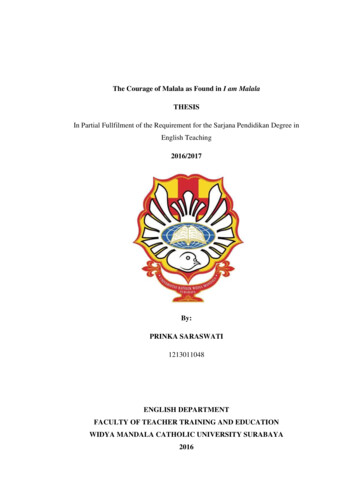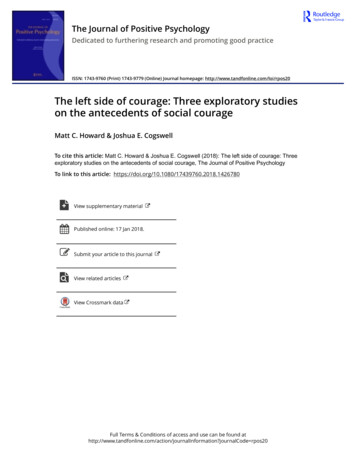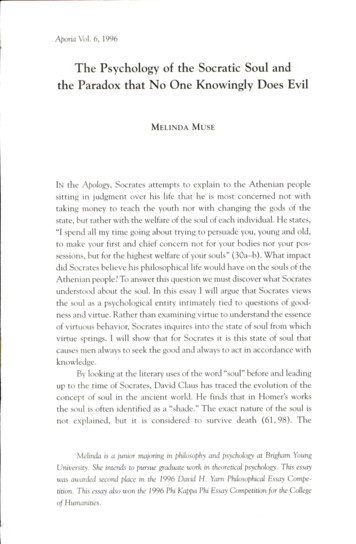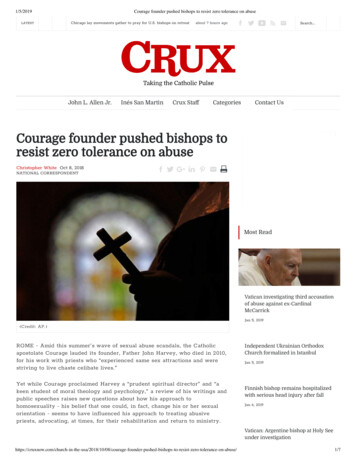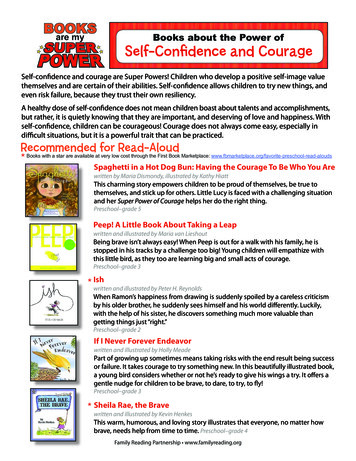
Transcription
The Courage to SufferCourage Interior Final.indd 11/6/20 1:07 PM
Courage Interior Final.indd 21/6/20 1:07 PM
1The Courage to SufferA New Clinical Framework forLife’s Greatest CrisesDaryl R. Van Tongeren, PhDSara A. Showalter Van Tongeren, LCSWTempleton PressCourage Interior Final.indd 31/6/20 1:07 PM
Templeton Press300 Conshohocken State Road, Suite 500West Conshohocken, PA 19428www.templetonpress.org 2020 by Daryl R. Van Tongeren, PhDand Sara A. Showalter Van Tongeren, LCSWAll rights reserved. This book may not be reproduced, in wholeor in part, including illustrations, in any form (beyond that copyingpermitted by Sections 107 and 108 of the U.S. Copyright Lawand except by reviewers for the public press), without writtenpermission from the publishers.Set in Albertina 10.7/15.6 by Gopa&Ted2, Inc.Library of Congress Control Number: 2019951703ISBN: 978-1-59947-524-0 (pbk: alk. paper)ISBN: 978-1-59947-525-7 (ebook)This paper meets the requirements of ANSI/NISO Z39.48-1992(Permanence of Paper).A catalogue record for this book is available from the Library of Congress.20 21 22 23 2410 9 8 7 6 5 4 3 2 1Printed in the United States of America.Courage Interior Final.indd 41/6/20 1:07 PM
—For Grace Anne—And to our clients and students who know loss intimatelyand still demonstrate the courage to suffer.You have taught us deep strength, and we have learnedwhat flourishing is because of you.Courage Interior Final.indd 51/6/20 1:07 PM
Courage Interior Final.indd 61/6/20 1:07 PM
Contents1. An Existential Positive Psychology Framework32. Existential Themes of Suffering193. Sunset: The Sting of Suffering314. Dusk: Into the Darkness555. Midnight: The Deconstruction Process716. Dawn: The Reconstruction Process877. Daylight: Living Authentically1098. A Flourishing 65About the Authors173Courage Interior Final.indd 71/6/20 1:07 PM
Courage Interior Final.indd 81/6/20 1:07 PM
The Courage to SufferCourage Interior Final.indd 11/6/20 1:07 PM
Courage Interior Final.indd 21/6/20 1:07 PM
11An Existential Positive Psychology Framework“But there was no need to be ashamed of tears,for tears bore witness that a man had the greatestof courage, the courage to suffer.”—Viktor E. Frankl, Man’s Search for MeaningOur lives have been profoundly shaped by suffering.In early 2010, we were beginning to build our careers and felt thepromise of a somewhat expected future. Sara, while completing hersupervision hours toward her clinical license, was working with families of children with chronic and significant medical needs. Darylwas completing his fourth year of doctoral work and was in the thickof dissertation research studying how people find meaning in life,with hopes of going on the academic job market in the fall. We werefeeling settled, so we started trying to get pregnant. And like mostpeople, we didn’t notice that life was going as planned.Four months later, everything changed.In April, we received a phone call that upended our world and irrevocably altered our lives. Daryl’s brother Tim underwent surgery thatdid not go as expected. We immediately flew to Colorado to be withfamily. Within a few short weeks, Tim died at age thirty-four, leaving his wife to raise their three young children under the age of six.Because of the genetic nature of Tim’s illness, there was a high likelihood that we would experience a similar fate as Tim and his wife.We were haunted by the existential question: Would Daryl developCourage Interior Final.indd 31/6/20 1:07 PM
4 the courage to sufferthe same condition that took Tim’s life? To compound our grief, onespecialist stated that, given the genetic nature of Tim’s condition, weshould not have children. It was one loss after another.Years after this devastating blow to our dreams and our identity, webegan to seek consultation and additional specialists’ opinions, whoeventually gave us the green light to start a family. Our lost dreamwas given new hope. However, after almost two years of trying, wewere told, with a sense of finality, that we would not be parents. Ourinfertility diagnosis further added to our grief, and our suffering waspalpable. This pain and those experiences had become part of us andin many ways shaped us; how could we remove the pain or forget ourexperiences? We sought the help of friends and professionals, but thereality was we could not be unbroken. This was now our story.The Need for a New Approach to SufferingAs a professionally trained psychologist and clinical social worker,respectively, we challenged every cognitive distortion that we had:“our life was over” (catastrophizing), “this is all our fault” (personalizing), “we’re inadequate” (emotional reasoning), and we were still leftwith the simple fact that we would not be parents and that Daryl’sgenetic future was unknown. However, our story was not a cognitive distortion; our suffering was not a set of irrational thoughts thatneeded to be corrected. No amount of therapeutic mental gymnastics could make us feel unbroken. We needed a new approach—acompletely different way to think about suffering that allowed us tohold the pain in authentic ways while desperately seeking to flourish.Clinical work has long focused on alleviating suffering. However,not every therapeutic model is designed to help those in persistent,recurring, or unsolvable suffering. Many perspectives approach mental health concerns as discrete negative events that can be directlyresolved through cognitive adaptation, emotion regulation, orCourage Interior Final.indd 41/6/20 1:07 PM
an existential positive psychology framework 5behavioral modification strategies. Boiled down to its most basiclevel, many clinical approaches view suffering as a problem to be fixed,and then, once the symptoms subside, disregard the effect of theevent itself. This strategy falls short, however, when the event and itseffects have fundamentally changed the individual’s life and cannotbe resolved. There is no fixing death, infertility, loss of a dream, orthe permanent shift of one’s identity. Instead, these approaches mustaccount for deeply painful situations that alter your client’s life inways that cannot be reversed or solved. Our framework is designedprecisely for such situations. Put succinctly, we posit that suffering is aninherent part of life that must be engaged. And we suggest that your clinicalapproach should embody that truth.Overview of FrameworkWe propose an existential positive psychology approach to suffering.It highlights the necessity of identifying the core concerns underlyingeach person’s experience, as well as the importance of building strongrelationships, values, and virtues as ways to promote flourishing inthe midst of suffering. It is unique from other clinical approachesin that the centerpiece of this model is cultivating meaning, a component shared by both existential and positive psychology perspectives. Synthesizing these frameworks can provide a rich approach toengage your clients in their darkest and most difficult times of life, byhonoring their pain and finding ways to experience a rich and full lifeduring that pain.Existential approaches to psychotherapy, popularized by individuals such as Viktor Frankl and Irvin Yalom, contend that anxiety andsuffering arise, in part, from the persistent isolation of all humansand the inherent meaninglessness of the world, where the only certainty is death.1,2 Each person is inherently alone and is wired to findways to connect with others and create meaning while they are alive.Courage Interior Final.indd 51/6/20 1:07 PM
6 the courage to sufferPart of the existential process is accepting, and coming to terms with,these givens of human existence. Our approach provides a pathwayfor exploring the depth of your client’s situation by examining whatcentral fears are uncovered by their suffering and how it may beaffecting their ability to flourish. As people identify core features ofhuman existence as root causes of their suffering, they can learn tocreate meaning from within, rather than expecting to find meaningfrom the outside—regardless of their circumstances.Meaning is also a central feature of the positive psychology movement, which developed as a response to the majority of psychologicalresearch and clinical work that had focused solely on viewing people through the lens of mental disorders and abnormal functioning.3Psychology had become narrowly focused on the negative: distress,dysfunction, disorders, and disease. But this focus on the negativeprovides an incomplete view of human nature. Positive psychologyaddresses that “other half” by emphasizing how character strengths,virtues, and meaning contribute to the good life. In short, whereasmost other psychological perspectives help people cope with mentalillness, positive psychology helps people cultivate full and flourishing lives.The synergistic blend of the existential psychology perspectiveand the positive psychology perspective creates a shared goal: building meaning in all circumstances. Drawing from existential and positivepsychology,4 our approach examines the deep, underlying existentialconcerns that suffering exposes, while focusing on building meaningand promoting a full, whole life that is marked by authenticity andconcern for others. This approach requires balancing both motivations of depth and growth: Without sufficient depth, your clients willnot fully address the core root of their suffering; and without sufficient growth, your clients may stagnate and become overwhelmedby feelings of hopelessness, depression, and despair. Your role astherapist is to help your clients engage both motivations by helpingCourage Interior Final.indd 61/6/20 1:07 PM
an existential positive psychology framework 7them cultivate meaning. This intersection of perspectives is depictedin Figure RelationshipsReligionFigure 1. The existential positive psychology framework.Defining Terms: Suffering, Meaning,and How the Two RelateBefore we describe how to work with your clients in the process ofsuffering, it is important to define suffering and meaning, and clarifyhow to approach the relationship between the two concepts.The Difference between Pain and SufferingPain exists when your client is experiencing an event or a patternof thinking that (a) is explainable (i.e., has a clear source or reason),(b) has a relatively distinct trajectory (i.e., appears to be resolvablegiven enough time), and (c) is relatively focused (i.e., affects one primary area of life); in such cases, your typical therapeutic approachesmay be sufficient. Consider a client who seeks support after theexpected death of an elderly parent. Most therapeutic approaches,such as cognitive-behavioral therapy (CBT), are well-suited to help aclient alter their thoughts about a parent’s death, help them processtheir grief, encourage them to explore and express their emotions,Courage Interior Final.indd 71/6/20 1:07 PM
8 the courage to sufferand begin to navigate relational changes in their family. In situationslike these, the client’s pain has an easily identifiable source and canbe addressed by your usual treatment modalities.However, other forms of emotional pain are qualitatively different. Whereas pain may have some form of a solution, suffering ispersistent and may not be resolvable. Some suffering is so profound,so violating, or so dogged, that it fundamentally changes people inindelible ways and forces them to come to terms with core existentialrealities of life. Situations like these are unexplainable or violating, persistent and enduring, and fundamentally life-changing. You can experiencepain without suffering, but you cannot experience suffering withoutpain. Our approach is designed to help you work with clients whoare suffering.Consider a client who seeks support after the expected death of aparent from amyotrophic lateral sclerosis (ALS), a genetic and heritable disease that also has implications that affect not only your client but the immediate family as well. The death of their parent elicits existential concerns about their own death and the lives of theirchildren. You could attempt to employ a CBT approach and help theclient reframe how they think about dying or help them cope withthe emotional distress of losing a parent, but you would be workingfrom a limited perspective that only addresses a resolution from theaspect of losing a parent. What do you do with the very real idea thatyour client’s own health is at risk and that they will have to live withthat uncertainty? Our approach acknowledges that the pain your client feels is valuable and must be wrestled with and integrated, notremoved. Instead, your client can learn to bear this pain.What Is Meaning?Building meaning is the key to helping your clients who are suffering. We define meaning as the subjective feeling that my experiences and lifeCourage Interior Final.indd 81/6/20 1:07 PM
an existential positive psychology framework 9make sense, matter, and are purposeful.5 Researchers agree that there arethree main components of meaning: coherence, significance, andpurpose.6 A sense of coherence arises when people can make senseof events—when their experiences fit into their worldview or set ofbeliefs. People usually feel coherence when they explain why thingshappened in a way that is consistent with how they see the world.The central question pertaining to coherence is: Does this make sense?People experience significance when they feel like they have worth,value, and that they matter or feel connected to something larger thanthemselves. People usually feel significant when they have reciprocal relationships, when their work is consequential, and when theyare making a positive, lasting contribution to the world. The centralquestion pertaining to significance is: Do I matter?People achieve a sense of purpose when they have broader intentions toward which they can place their energy and effort. A sense ofpurpose gives people a reason for their actions and helps frame yourclient’s sense of identity. The central question pertaining to purposeis: Why am I here?Each facet of meaning acts as a protective factor during times ofsuffering. Coherence translates events in ways that make sense; significance helps people transcend themselves and connect with others;and purpose transforms experiences, including pain and suffering, intosomething greater.Meaning and Happiness Are Not the SamePeople may use the terms “meaning” and “happiness” interchangeably, but it’s important to distinguish the difference between the twoconcepts. As an example, parents often report less marital satisfaction after having children compared to nonparents.7 In addition, themore children a couple has, the less satisfied they are in their relationship. Cross-cultural research confirms these results and also showsCourage Interior Final.indd 91/6/20 1:07 PM
10 the courage to sufferthat Americans experience the strongest negative effects.8 Yet mostof these parents would likely report that having a child is incrediblymeaningful and significant; the meaning, not necessarily happiness,derived from parenting is what contributes to parental well-being.9Despite its strain on happiness, many do not forgo being parents inorder to be happier. They choose meaning.Another study directly compared happiness and meaning to clarify how they differ. People report being happy when stress, struggles, and negative events are largely absent. Meaning, in contrast,was present when people reported being stressed, struggling, or wereexperiencing adversity.10 Whereas hardships are at odds with happiness, people find meaning in such circumstances.To compare meaning and happiness over time, a longitudinalstudy followed seventy-nine people who were completing a practicum course in a mental health setting at the beginning of the study.They completed weekly journals while enrolled in their practicumcourse and then later filled out surveys on their coping, emotionalregulation, grit, gratitude, and well-being. The results revealed thatmeaning-making was strongly and positively related to adapting wellto future negative events. Happiness, on the other hand, did not predict adaptive functioning in the future.11 Cultivating meaning nowcan better prepare people for adversity or suffering again in the future.This research provides powerful evidence that meaning, rather thanhappiness, is an important component in a flourishing life.Why We Are Focusing on MeaningAs previously noted, meaning-focused therapy is integral to positive client outcomes. For example, a meta-analysis of sixty clinicaltrials with more than 3,700 people indicated that meaning-focusedapproaches significantly improved clients’ quality of life and decreasedCourage Interior Final.indd 101/6/20 1:07 PM
an existential positive psychology framework 11psychological stress relative to treatment-as-usual.12 The benefits inreducing psychological stress occurred because clients were able toincrease their sense of meaning via therapeutic interventions.But do meaning-focused approaches work with clients who aresuffering and facing existential concerns? Research from work withpatients who have cancer suggests that they do. A clinical intervention with more than 250 late-stage patients who have cancer revealedthat those who received meaning-centered group psychotherapy overthe course of eight weeks reported better outcomes than those whoreceived the standard treatment on a host of psychologically relevant variables: They were less depressed, more hopeful, and reportedless physical distress, greater spiritual well-being, and higher qualityof life.13 Although standard treatment is helpful, the improvementswere significantly greater for the meaning-focused group, especiallyon indicators of severe despair (e.g., wishing for a hastened death,hopelessness), leading the researchers to assert that meaning-focusedapproaches that address existential issues are more effective in thesecases than traditional interventions.Another large-scale study of cancer survivors, based on more than8,400 cancer survivors from the American Cancer Society’s Studyof Cancer Survivors-II database, revealed that religious and spiritualbeliefs were associated with better mental and physical functioning,precisely because they provided individuals with a strong sense ofmeaning in life.14 Put differently, meaning was the mechanism bywhich beliefs led to flourishing. This research provides direct evidence that cultivating meaning amid suffering, especially in the wakeof events that do not seem to have a readily apparent or availableresolution, is particularly beneficial for clients.However, there’s an important caveat in this research. A systematic review of seventy different research studies highlighted that thepositive health benefits of meaning seem to be reserved for those whoCourage Interior Final.indd 111/6/20 1:07 PM
12 the courage to sufferfind meaning, not simply those who search for it.15 It is importantto keep in mind that helping your client find a sense of meaning iscrucial, because meaning may be the biggest protective factor whenlife brings suffering.The key to working with your clients—especially if their sufferingmay lead them to feel as though they will never get through it—isbuilding meaning in life.The Role of Meaning in SufferingWe want to clarify three points about the role of meaning in suffering.First, we are not suggesting that pain is justified through meaning.Finding meaning can help transform already deeply painful experiences into something more without invalidating or excusing them.Second, we also are not suggesting that people intentionally seek outpain in their lives as a pathway to flourishing. Although meaningcan help transform pain en route to a flourishing life, other avenuestoward flourishing are likely available. Rather, we are suggesting thatwhen people are suffering, cultivating meaning helps transform suchexperiences into something greater than the pain, making the painmore bearable. Third, without denying or invalidating their pain, youcan help your client see that (a) they still matter, greatly; (b) they canbroaden their perspective and connect with others, a larger cause,or the Divine; and (c) the experience of pain does not preclude themfrom contributing meaningfully to the lives of others. In their suffering, the translational, transcendent, and transformative features ofmeaning may not alleviate all their pain, but they may certainly helpwiden their perspective when the pain feels overwhelming. Thus, theparadox of suffering is this: Suffering makes it challenging to find meaningbut meaning is precisely what is needed to flourish.Courage Interior Final.indd 121/6/20 1:07 PM
An Existential Positive Psychology Framework “But there was no need to be ashamed of tears, for tears bore witness that a man had the greatest of courage, the courage to suffer.” —VIktor E. Frankl, Man’s Search for Meaning Our lives have been profoundly shaped by suffering. In early



